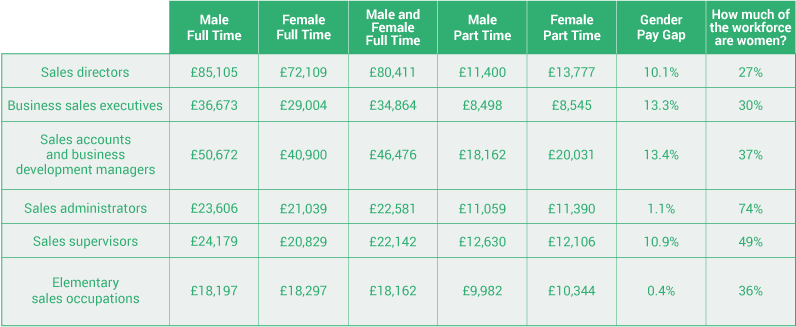More women than ever are working in sales, a recent study by the Office of National Statistics shows. Women make up roughly half of the workforce when it comes to sales, however the figure changes slightly depending on the role. Women make up the biggest portion of the workforce as sales administrators and the smallest part of the workforce at the director level. Of all business sales executives, 30% are women, a figure similar to business development managers where 37% of the roles are filled by women.
Men make up roughly half of the workforce as sales supervisors (51%), over half of the workforce at a junior level (63%) and almost three-quarters of the workforce at director level (73%)
What’s the gender pay gap like in sales jobs?
The gender pay gap for those working in sales occupations has dropped by 0.3% to sit at 4.4% across all roles, nearly half the national average gender pay gap of 8.9%
The figures also showed that the gap is narrowing for other roles. For Sales Administrators, the pay gap is just 1.1% for those in full-time work, 0.4% for those in junior to mid-level sales roles and -10.3% for part-time sales account managers and business development managers.
How much can you earn working full-time in sales?
The average hourly wage for those working in sales, across all roles, all ages and all employment types (full-time or part-time) is £10.07 per hour, which is roughly £20,000 per annum. However, as you will see, only junior roles tend to take this as a yearly salary, with most sales roles sitting between £22,000 and £35,000.
If you are entering the world of sales as a sales administrator, for example, you can anticipate a starting salary of between £15,000 and £24,000 as a guideline. However, this salary can increase based on your experience, whether you have taken related sales courses or whether you have a relevant degree in the industry. The average salary for this role sits towards the upper end of this estimation: at £22,581.
The best paying role in sales for those working full-time is, unsurprisingly, the most senior one. As a sales director or senior sales manager you can expect to take home an average full-time salary of £80,411 – considerably higher than the UK average salary of £36,611 (all roles across the UK based on full-time work). You do not necessarily need a sales degree (although these can help) or related qualification to be a sales director, and often many people work they way up to this position, which you can see by the salary range. For sales managers, the starting salary sits around £22,000 and can go up to £70,000 with experience.
How much can you earn working part-time in sales?
Being senior is not necessarily better when it comes to working part-time. The study showed that part-time sales directors and managers took home between £11,400 and £13,777. However, sales business development managers can earn between £18,162 and £20,031 working part-time.
You can see the full list of roles, their full-time and part-time salary and the gender pay gap in the table below:

[simplyjobs site_url=”https://www.simplysalesjobs.co.uk/” placement=”post” site_name=”Simply Sales Jobs” username=”SEO_TEAM” password=”fmgseo” feed_identifier=”blog_ssj_all” ][/simplyjobs]
Sales interview questions and how to answer them
So your CV hit the spot? Now it’s time to interview for the job you want. The sales industry is filled with talented and skilled professionals, and if you’re one of them, you should have no problem getting your foot in the door for an interview. Interviews are tricky,...
Group interviews for sales jobs: What to expect
Group interviews are used by large employers who are aiming to fill multiple vacancies. They are frequently used by sales firms when selecting a new intake of trainee sales executives, graduate recruits and telesales professionals, for example.
How to write your sales manager CV
Ready to work your way up to a career as a sales manager? Then you'll need a CV glowing with boasting figures, leadership and much more. Writing a CV can be time consuming - we get it! But ultimately, it's your CV and cover letter that are going to get...





